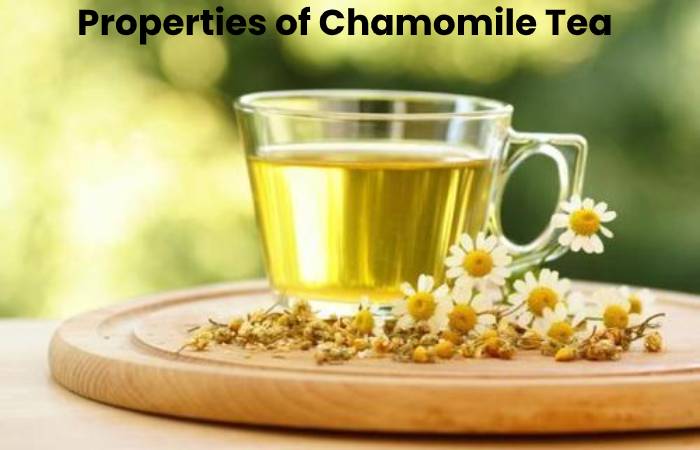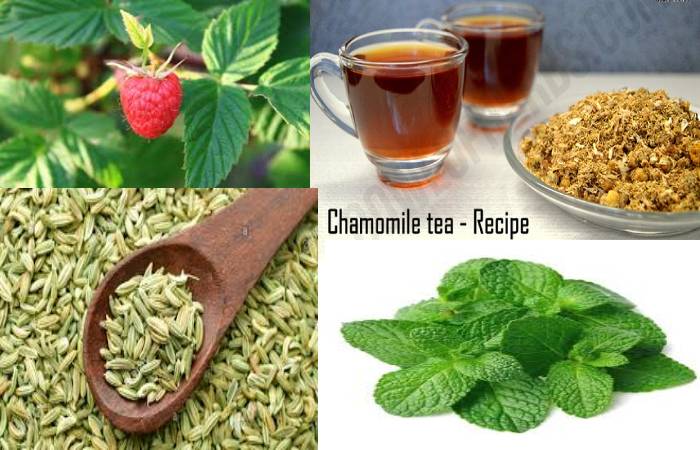Table of Contents
Chamomile Tea Definition
Chamomile tea is known for its medicinal applications. Although it does not serve to cure diseases, it can be helpful to calm specific symptoms.
Chamomile tea is a natural drink that became popular for interesting medicinal applications.
While many of its uses come from popular literature, there is now a wide variety of research supporting its properties.
The plant is part of the Asteraceae family, and there are numerous species. However, the most used in the preparation of tea are Matricaria chamomilla and Matricaria Nobilis.
What are the Properties of Chamomile Tea?

Chamomile tea obtains from the dried flowers of the plant infused in water. It characterizes by having a light floral aroma and a mild flavor that is pleasant to the palate.
It concentrates bioactive compounds with therapeutic potential.
Specifically, it has substances such as:
- Sesquiterpenes.
- Flavonoids.
- Coumarins.
- Polyacetylenes
This composition, which brings together around 120 chemical constituents, gives the plant various health properties.
Thus, both the tea and the extracts and other Chamomile presentations have antimicrobial, anti-inflammatory, antioxidant, and antispasmodic activity.
The uses of chamomile tea are not a substitute for pharmacological medicine, but they can be helpful.
What are the Benefits of Chamomile Tea?

In medicine, chamomile tea is one of the protagonists. Although it knows that it should not be the first-line treatment against diseases, some use it as a complement to alleviate the symptoms of certain conditions.
1. Helps to Relieve Menstrual Pain
- The phenolic compounds contained in chamomile tea have an antispasmodic effect that favors the relief of menstrual pain.
- It consumed this tea for a month reduced dysmenorrhea severity.
- On the other hand, it was a relaxing drink. The participants also reported less period-associated anxiety.
- The plant decreases the production of prostaglandins, substances responsible for pain, and inflammation.
2. Supports Digestive Health
- The digestive properties of chamomile tea are the best. For hundreds of years, this drink has prepared to soothe gastrointestinal complaints such as flatulence, indigestion, diarrhea, nausea, and vomiting.
- These effects are attributed to its antimicrobial, anti-inflammatory, and relaxing potential.
3. Promotes a Better Quality of Sleep
- There is no natural herb that alone can fighting sleep disorders. Despite this, some plants, such as Chamomile, serve as allies to sleep better.
- Its apigenin content, an antioxidant, stimulates the brain’s receptors and decreases insomnia.
- It consumed chamomile tea for two weeks reported better sleep quality. In turn, they showed fewer depressive symptoms associated with difficulty sleeping.
4. Control of Blood Glucose Levels
- Improving your eating habits and lifestyle is essential to keep blood glucose levels under control. However, for specific glucose rises, it is favorable to ingest drinks such as chamomile tea.
- Plant extracts help stimulate the functions of the pancreas produce insulin body responsible.
- The latter is the hormone responsible for regulating sugar levels in the body. And while evidence is lacking, the findings have been seen as promising.
5. Supports Heart Health Care
- The antioxidants in tea, especially the flavonoids, have a beneficial effect on heart health.
- Of course, this is not to say that it can substitute for medical treatment for heart conditions., included in the regular diet, it helps reduce the risk of disease.
- A small study published in the Journal of Endocrinological Investigation found that diabetic patients who consumed chamomile tea with meals.
- It had improvements in their total cholesterol, triglyceride, and harmful cholesterol levels.
6. Anxiety and Depression
- The sedative properties of chamomile tea are beneficial against mental stress states, such as anxiety and depression.
- Although it usually uses in aromatherapy for this purpose, its consumption in tea is also useful.
7. Skin Health
- The topical application of chamomile tea has shown positive effects in mild skin symptoms such as irritation, redness, and flaking.
- There are even those who use it for burns or problems such as eczema.
8. Colds
- Inhaling the vapors given off by hot chamomile tea works as an adjunct against congestion and nasal irritation caused by the cold.
9. Bone Care
- The evidence on the consumption of chamomile tea and the prevention of bone diseases is still weak.
- Although this drink has anti-estrogenic effects that help prevent bone density loss.
- Chamomile may help sleep, skin, and cardiovascular health conditions.
Recipes with Chamomile Tea

The teas can prepare using dried flowers of Chamomile or mixtures made with other teas, according to the taste and the intended benefits.
1. Tea to Calm and Relax
Dried chamomile tea has relaxing and mildly sedative properties that help treat insomnia, anxiety, and nervousness. This tea helps reduce cramps and spasms during menstruation.
Ingredients
- 2 teaspoons of dried chamomile flowers;
- 1 cup of water.
Preparation
- In 250 ml of water, add the teaspoons of tea. Cover and let stand about 10 minutes and strain, then drinking.
- It should take 3 times a day, and if necessary, it can sweeten with a teaspoon of honey.
- In addition to this, you can add a teaspoon of dry cat grass to increase the relaxing and sedative effect.
- According to pediatrician’s indication, this tea can be used by babies and children to reduce fever, anxiety, and nervousness.
2. Tea to Treat Poor Digestion and Gas
Chamomile tea with anise and marshmallow root has anti-inflammatory action and calms the stomach, reducing gas, acidity in the stomach and regulating the intestine.
Ingredients
- A teaspoon of dried Chamomile;
- One teaspoon of anise seeds;
- 1 teaspoon of yarrow;
- 1 teaspoon minced marshmallow root;
- A teaspoon of filipéndula;
- And also, 500 ml of boiling water.
Preparation
- To 500 ml of boiling water, add the mixture and cover.
- Let stand for about 5 minutes and strain before drinking.
- This tea should consume 2 to 3 times a day or whenever necessary.
3. Chamomile Tea to Refresh Tired and Puffy Eyes
Chamomile tea with crushed fennel seeds and elderflower, when applied to the eyes, help to refresh and reduce puffiness.
Ingredients
- 1 tablespoon of dried Chamomile;
- 1 tablespoon of crushed fennel seeds;
- One tablespoon of dried elderflower;
- And also, 500 ml of boiling water.
Preparation
- And also, add the mixture to 500 ml of boiling water and cover. Let stand for about 10 minutes, strain, and place in the refrigerator.
- This tea should apply to closed eyes using a moistened flannel for 10 minutes, whenever necessary.
- This tea can also help treat vaginal infections to calm and reduce inflammation of the skin in irritation, eczema, or insect bites or treat psoriasis.
4. Chamomile Tea to Soothe a Sore Throat
Chamomile tea can also use to help soothe irritated and inflamed sore throats due to its anti-inflammatory properties.
Ingredients
- 1 teaspoon of dried Chamomile flowers;
- And also, 1 cup of boiling water.
Preparation
- And also, add the Chamomile to a cup of boiling water and let it steep until cool. This tea should use as a gargle.
- Besides this, it can also use to facilitate the healing of gingivitis and stomatitis.
5. Tea to Calm Dizziness
Tea with raspberry and peppermint helps relieve nausea and dizziness.
Ingredients
- 1 teaspoon of dried Chamomile;
- 1 teaspoon of dried peppermint or raspberry leaves;
- And also one cup of boiling water.
Preparation
- To 1 cup of boiling water, add the mixture and cover. Let stand for around 10 minutes and strain before drinking.
- This tea should be drunk 3 times a day or whenever necessary.
- However, pregnant women should not take without medical guidance. Learn more about the benefits of peppermint.
6. Tea to Relieve Flu and Cold
Chamomile tea helps relieve the symptoms of sinusitis, flu, chills, and inflammation in the nose due to its properties that reduce inflammation.
Ingredients
- 6 teaspoons of dried chamomile leaves;
- And also, 2 liters of boiling water.
Preparation
-
- Add the dried flowers to 1 to 2 liters of boiling water, cover, and let it rest for about 5 minutes.
- The steam from the tea should inhale deeply for about 10 minutes, and for the best results, you should place your face on the container and cover your head with a large towel.
- In addition to this, Chamomile can use other forms besides tea, such as cream or ointment, essential oil, lotion, or dye.
- When used in the form of a cream or ointment, Chamomile is an excellent option to treat skin problems such as psoriasis, cleanse the skin and reduce inflammation.
Also Read: Abdominal Fat – Definition, How to Burn, Best 7 Foods, and More
- MORE INFO:- itbaicses

